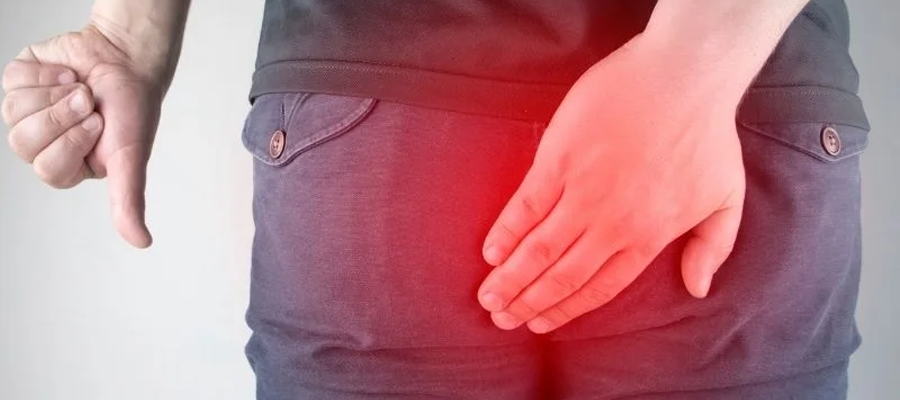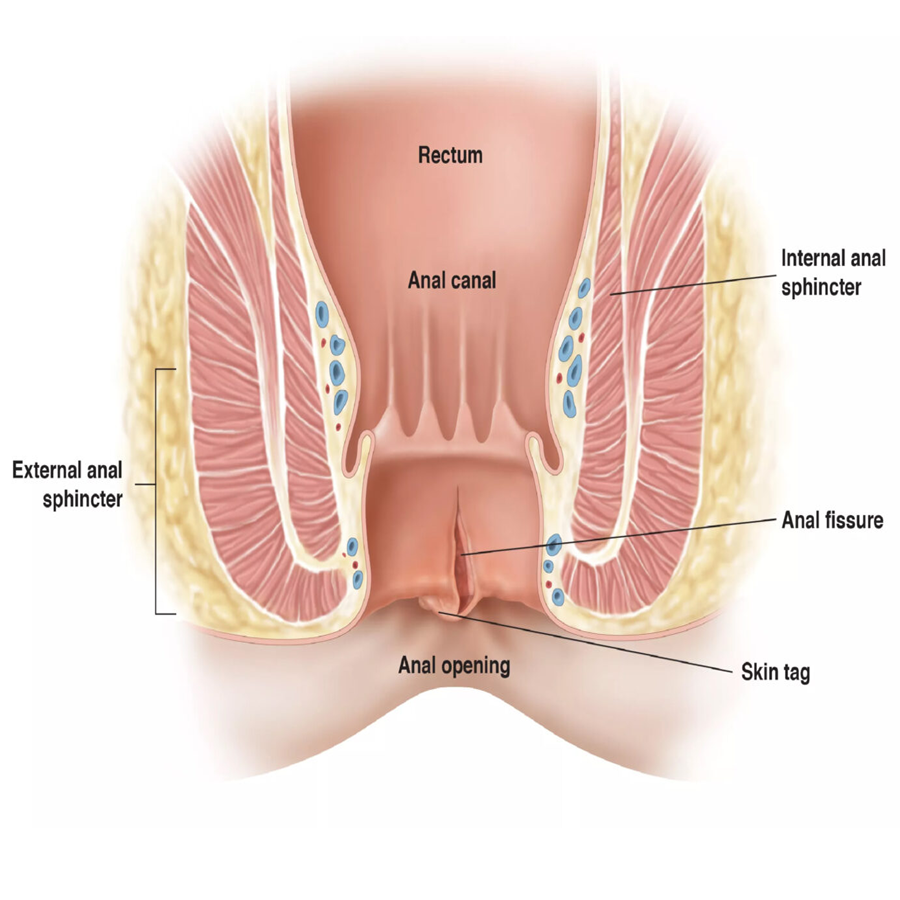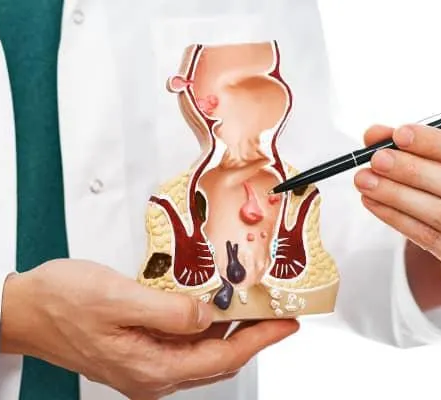Anal Fissure Treatment in Hyderabad
Working Time
- Mon-Thu 10:00 – 20:00
Friday 10:00 – 20:00
Saturday 10:00 – 19:00
Contact Info
-
Phone: +91 88862 41919
Ask the Experts
Anal fissure treatment in Hyderabad is a small tear or crack in the lining of the anus. This condition can cause significant discomfort and pain, especially during and after bowel movements. Anal fissures can occur in anyone but are most common among young adults and elderly individuals. They can be acute (short-term) or chronic (long-lasting), depending on their duration and the underlying issues causing them.
Anal Fissure Surgery in Hyderabad
Anal fissure surgery in Hyderabad is considered when fissures do not heal with conservative treatments. This procedure helps reduce pain and promotes faster healing by relieving pressure on the anal canal.

Causes of Anal Fissures

Anal fissures are typically caused by trauma to the anal canal, which can result from:
- Constipation and Straining: Hard or large stools that require excessive straining can tear the sensitive lining of the anus.
- Chronic Diarrhea: Frequent bowel movements and loose stools can irritate and damage the anal area.
- Childbirth: Women may experience anal fissures during or after childbirth due to the strain and pressure.
- Anal Intercourse: This can also cause trauma to the anal canal, leading to fissures.
- Inflammatory Conditions: Conditions such as Crohn’s disease or other inflammatory bowel diseases can contribute to the development of fissures.
Symptoms of Anal Fissures
The symptoms of an anal fissure can be quite distressing and may include:
- Sharp Pain: Especially noticeable during and after bowel movements.
- Itching or Irritation: Around the anal area.
- Bleeding: small amounts of bright red blood on the toilet paper or stool.
- Visible Tear: In the skin around the anus, often seen as a small crack.
Diagnosis of Anal Fissures
To diagnose an anal fissure, a healthcare provider will typically:
- Conduct a Physical Examination: This often includes a visual inspection of the anal area and may involve a digital rectal exam.
- Ask About Symptoms: detailed questions regarding the onset, duration, and nature of the pain and bleeding.
- Use Diagnostic Tools: In some cases, additional tests such as an andoscopy or sigmoidoscopy may be performed to rule out other conditions or assess underlying causes.
What is Laser Treatment?
Laser treatment for anal fissures is a minimally invasive procedure that uses concentrated light to precisely target and treat the fissure. The laser helps to remove scar tissue, reduce inflammation, and stimulate healing.
Advantages of Laser Treatment
- Minimally Invasive: Unlike traditional surgical options, laser treatment involves no incisions, which reduces recovery time and the risk of complications.
- Reduced Pain: The procedure is typically less painful than conventional methods, leading to quicker relief.
- Faster Recovery: Patients often experience a shorter recovery period, returning to normal activities much sooner.
- Lower Risk of Infection: The precision of laser treatment minimizes the risk of infection and bleeding.
- Improved Healing: Laser therapy promotes rapid healing of the fissure, often leading to a permanent resolution of symptoms.
Other Treatment Options
While laser treatment offers significant benefits, other treatments may still be considered depending on the individual case:
- Surgical Options: Traditional surgery might be necessary for chronic fissures, involving more extensive procedures to repair the fissure and relax the anal sphincter.
- Botox Injections: Used to paralyze the anal sphincter temporarily, reducing pain and aiding in healing.


Prevention of Anal Fissure:
Preventive measures include
- Eating a High-Fiber Diet: Consuming fruits, vegetables, and whole grains to keep stools soft and regular.
- Staying Hydrated: Drinking plenty of water to avoid constipation.
- Avoiding Straining: Going to the bathroom promptly and avoiding excessive straining during bowel movements.
- Maintaining Good Anal Hygiene: Using soft toilet paper or moist wipes and wiping gently.
- Managing Constipation and Diarrhea: Eating a balanced diet, exercising, and using medications as needed.
- Maintaining a Healthy Weight: Reducing pressure on the anal area through weight management.
Faqs For Anal Fissure Treatment
An anal fissure is a small tear or crack in the lining of the anus, often causing sharp pain, itching, and bleeding during or after bowel movements.
Common causes include constipation and straining, chronic diarrhea, childbirth, anal intercourse, and inflammatory conditions like Crohn’s disease.
Prevent anal fissures by consuming a high-fiber diet, staying hydrated, using stool softeners if needed, and avoiding excessive straining during bowel movements.
Diagnosis is typically made through a physical examination, possibly including a visual inspection and digital rectal exam. Further diagnostic tools like anoscopy may be used if needed.
Treatment options include conservative measures (diet and stool softeners), topical treatments, warm sitz baths, and advanced options like laser treatment.
Laser treatment uses concentrated light to target and heal the fissure with minimal invasiveness. It helps remove scar tissue, reduce inflammation, and promote healing.
Laser treatment is minimally invasive, involves less pain, offers faster recovery, lowers the risk of infection, and provides quicker healing compared to traditional methods.
Preoperative preparation for laser treatment generally includes:
○ Consultation: Discuss your medical history and any medications with your doctor.
○ Avoid Certain Medications: Follow instructions to stop blood-thinning medications or supplements.
○ Dietary Adjustments: You may be advised to follow a special diet or fast for a short period before the procedure.
○ Hygiene: Maintain proper hygiene in the anal area as directed by your healthcare provider.
The procedure is usually performed on an outpatient basis. You will be given local anesthesia to numb the area. The laser treatment itself is quick and typically well-tolerated.
Postoperative care involves: – Pain Management: Take prescribed pain relievers as directed and use over-the-counter options if needed. – Hygiene: Keep the area clean and dry. Follow any specific instructions from your doctor regarding cleaning and care. – Activity: Avoid strenuous activities and heavy lifting for a period of time. – Diet: Continue to consume a high-fiber diet and stay hydrated to prevent constipation. – Follow-Up Appointments: Attend scheduled follow-up visits to monitor healing and address any concerns.
To prevent recurrence, maintain a high-fiber diet, stay hydrated, use stool softeners if necessary, and avoid excessive straining during bowel movements. Address any underlying conditions with your healthcare provider.
A sentinel pile is a small skin tag that often forms next to a chronic anal fissure. It results from the persistent irritation and healing process of the fissure.
Sentinel piles can be bothersome or irritating but are generally not harmful. They may complicate the assessment of the underlying fissure.
A sentinel pile, which results from a longstanding anal fissure,it may be removed surgically or treated in conjunction with fissure treatment.
Contact your doctor if you experience severe pain, persistent bleeding, or symptoms that do not improve with treatment. They can help determine the appropriate course of action.
